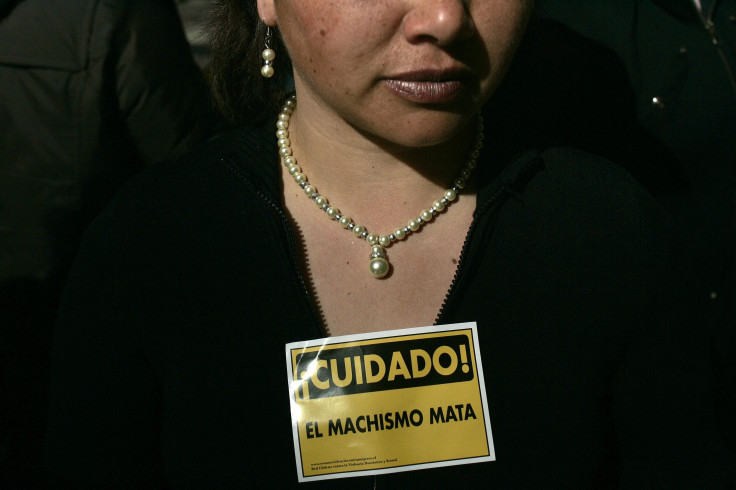
As a victim of domestic violence who cooperated with police to put her assailant behind bars, Evelin is likely eligible for the U visa, a special form of deportation relief. An undocumented Honduran immigrant in her mid thirties, she was surprised last week when Gaston County District Attorney Locke Bell grounded her U visa application with the rationale that she and her attacker are both Latino. Fred Clasen-Kelly of the Charlotte Observer broke the story, and confirmed the North Carolina prosecutor’s legal view, which some might call perverse.
“Assault on a Latino by a Latino is not the rationale for the statute,” Bell wrote in his rejection. “In my position, I have to make decisions that people don’t like [....] This is one of them,” Bell told the Observer.
One of the people who doesn’t like Bell’s decisions on U visas is Michael Moore, a fellow prosecutor from Beadle County South Dakota and President of the National District Attorney's Association (NDAA). Moore was shocked to learn that one of his colleagues would consider race for a U visa. He described them as a key tool for protecting victims, and stressed that applications routinely receive prosecutors’ stamps of approval.
“I’ve had 100 [U-Visa] applications in my 20 years as prosecutor. I’ve signed off on [virtually] all of them. It’s just a matter of understanding domestic violence and sexual assault,” Moore told the Latin Times. “DAs shouldn’t make determinations based on race. Not in plea bargain negotiations, not in U-Visas. Nothing.”
When the latin times first spoke to Moore, the wasn’t sure if Bell was a part of the NDAA. If he were, Moore explained, his actions could lead to expulsion. When asked for another example of prosecutorial misconduct that would merit expulsion, Moore cited the 2007 Duke case, in which a prosecutor faked DNA results and withheld discovery from the defense. Moore later confirmed that Bell is not a member of the NDAA.
“I can’t even find the words to describe [what Bell reportedly did]... unprofessional is enough... despicable might be close,” Moore said.
Locke Bell’s office did not respond to a request for comment.
No Recourse For Evelin?
The ACLU has already contacted Evelin’s lawyer, Theodore Maloney, exploring the possibility of suing Bell’s office. Yet even if that civil rights group won a discrimination suit against Bell, there’s no legal avenue to force him to sign the certification. At the heart of the case lies Bell’s apparent confusion over what certification actually means, and it might be troubling to learn how little the lawyer seems to know the law.
The form that he refused to certify -- 918B -- is described by immigration officials as “a required piece of evidence to confirm that a qualifying crime has occurred and that that the victim was helpful, [...] or is likely to be helpful in the [...] investigation.” In essence, Bell is already getting it wrong by thinking that he’s making a “decision” on Evelin’s application when in fact he’s merely supposed to relay information. Yet because that form 918B is “discretionary,” no one can dispute his judgement, for any reason. There’s no accountability.
“Neither DHS nor any other federal agency have the authority to request or demand that any law enforcement agency sign the certification. There is also no legal obligation to complete and sign Form I-918B. However, without a certification signed by law enforcement, the individual will not be eligible to be granted a U visa,” a USCIS Official told the Latin Times.
Immigration advocates argue that the consequence of Bell’s apparent mishandling of Evelin’s doesn’t just harm her, but the community as a whole. The fear is that immigrants won’t report crime out of fear of deportation. If your neighbor is undocumented and someone breaks into your house, the argument goes, should they have a disincentive of deportation?
“The purpose of the U visa was to make immigrants more comfortable, about overcoming a significant hurdle, which is that reporting crime could lead to deportation,” Tara Tidwell Cullen Director of Communications National Immigrant Justice Center told the Latin Times.
Educating Prosecutors And Police
Gaston County, South Carolina isn’t the only place where Latinos are routinely denied U visas. In fact, many of the experts who’ve commented on this story described systemic yet silence racism against Latino crime victims. “A lot of our clients are denied for questionable reasons or receive no response or justification,” Cullen said. “[Authorities will say, ‘We want to send them back,’ or some say, ‘We don’t like Mexicans,’ ” Deborah Weissman, a researcher, told the Observer. Even Michael Moore, the North Dakota prosecutor, told the Latin Times that police in his county derailed U visas for no reason.
“In my own personal experience, I had a police chief who never signed off on [U-Visas]. He never stated his reasons,” Moore said, adding that the chief is now retired.
Bell’s apparent ignorance has shown how little the U visa program is understood, and might eventually help advocates inform other D.A.s. Moore told the Latin Times that after hearing about the case, the NDAA might consider drafting more guidance for members. Cullen says that her organization already offers training to police agencies, and can connect interested prosecutors to more resources. The Department of Homeland Security already publishes its own guide.
Though he’s disappointed at Evelin’s prospects for securing a U visa with Bell in office, Maloney says that he thinks the attention on case could help raise awareness.
“We’re trying to shine the light as much as we can, so that [prosecutors] don’t attempt this again.”
© 2025 Latin Times. All rights reserved. Do not reproduce without permission.




